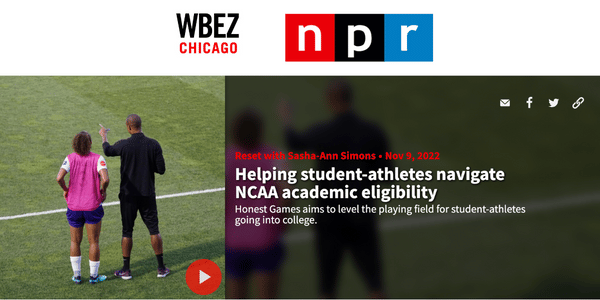What Does Test-Optional Mean? Understanding the College Application Process
Updated on Jun 27, 2024

If you’re applying to college, you’ve probably heard the terms “test-optional” and “test-blind.” The growing trend of college admissions going test-optional or test-blind has been accelerated by COVID-19 and the increased applications and diversity of incoming students.
According to the National Center for Fair & Open Testing (FairTest) – a nonprofit that advocates for the elimination of testing requirements for admissions and scholarships – 80% of schools are ACT/SAT-optional or test-blind for current high school seniors. More than 3/5th of all colleges and universities in the nation have already committed to remaining test-optional or test-blind for fall 2023 applicants.
So what does it mean? Should student-athletes still prepare to take the SAT or ACT?
Test-Optional means a college or university does not require the ACT or SAT as part of your application, but will accept the scores as part of your application if you want. Test-optional colleges may also still use ACT or SAT scores during the financial aid review process.
Test-Blind means a college or university does not accept test scores at all during the admissions process. However, test-blind universities will often still accept test scores to test into specific levels when you enroll in college.
NCAA + NAIA Standardized Test Requirements
The NCAA Division I (DI) Council voted to eliminate test score requirements for initial-eligibility for incoming college freshmen student-athletes. Since Fall 2020, the NCAA has waived standardized test requirements for those entering college, now standardized tests will no longer be required to meet NCAA Initial Eligibility for all DI and Divison II (DII) students, effective immediately.
NCAA Division III (DIII) programs do not require test scores in order to compete, as DIII does not require students to be cleared by the NCAA Eligibility Center. To compete at the DIII level, your requirements will be solely based on the specific admissions requirements of your college. If you’re admitted, you pass the initial requirements to compete as a freshman.
Student-athletes often choose NCAA DIII colleges for the academic and athletic level that best fit their needs and aspirations. Learn why competing at one of the 440 DIII schools might be the right fit for you.
While NCAA and NAIA (National Association for Intercollegiate Athletics) share several similarities, it should also be noted that the NAIA still has a test score requirement option for incoming freshmen who do not graduate from high school with a minimum 2.3 School GPA.
Financial Aid + Test Scores
Even at test-optional and test-blind universities, test scores can still be used during the financial aid review process.
Every college and university will post on their website what factors they use in their scholarship decision process. Some will use SAT and ACT scores, while others will look at different factors. For example, the Indiana University Office of Admissions states that “the assessment of a student’s academic performance is based on a number of factors, including high school GPA, grades received in coursework required by the Office of Admissions, and rigor and performance in advanced courses (AP, IB, Honors, etc.).”
The grades you earn, the rigor of courses, and how you perform in your high school advanced courses will be influential in how much academic scholarship money you can earn if test scores are not a factor. Some colleges will evaluate your Free Application for Federal Student Aid (FAFSA) to determine which other kinds of scholarships, like merit-based scholarships, you could qualify for.
Plus, a college (and college coach) may take your application more seriously when you’ve submitted a FAFSA.
Do Student-Athletes Still Need Test Scores At Test-Optional Schools?
You might be asking, now that the NCAA has waived test scores for initial eligibility and 80% of colleges have gone test-optional or test-blind, why are college coaches still asking for test scores?
While test scores are mostly optional for admissions, they are still a possible factor for student-athletes being recruited for college athletics. A high test score can be one of many factors in painting the picture of a strong academic applicant who will be successful as a college student. A strong score could be the tipping point for your application.
Test scores are often used in financial aid awards. For many programs that offer athletic scholarships, if they allow students to stack scholarships, the test scores can provide additional aid to students in the program that does not come out of the team’s allotted scholarships. For programs that don’t offer athletic scholarships, merit aid can be granted based on test scores.
What Is A Good Test Score For Student-Athletes?
Deciding what’s a “good test score” will depend on each college. It is up to the student-athlete to ask each coach (once they’ve developed a rapport) if they require or prefer test scores and if so, what is the minimum score needed for admission or if a test score is a deal breaker.
What qualifies as a “good test score” may also be different for each student at the same college. And the same college may have different unofficial admissions requirements depending on the sport.
The rigor of a student’s transcript, GPA, essays, recommendations, or extracurricular activities could outweigh the need for a high test score. In other cases, a student who will make a big athletic impact immediately could factor into the admission requirements the college coach communicates. A college coach may balance out the admissions statistics of a recruiting class by recruiting one student with an exceptionally strong academic record and high test score to balance out a standout athletic recruit with a slightly lower academic performance. Don’t make assumptions. Ask the college coaches what they are looking for!
Remember… just because a school ask for test scores does not mean it’s a requirement to be admitted.
Balancing mental health for juniors and seniors in high school is difficult. Students are overwhelmed with heavy school workloads, athletic training, competition, college applications, and intense test prep. Getting a better SAT or ACT is not always the answer.
For many students, taking advantage of test-optional and test-blind admissions alleviates additional pressure to perform. If you’ve decided that standardized tests are not your strong point, focus your time on doing well in your school classes. If you’ve decided to forego test scores as part of your college application, you may have to accept that certain college programs are not an option. You will narrow down your list through conversations with college coaches to understand what their admissions officers are requiring. On the other hand, you may learn that you are only 1 point away from the college’s minimum ACT score and strive to reach that goal. Every student must make a personal decision about how they architect their college applicant profile.
Things to Know Before Applying to Test-Optional Schools
1. There are Different Types of Test-Optional Colleges
A test-optional college lets students decide whether they want to submit test scores with their application. Most test-optional schools will consider SAT and ACT scores if they are submitted, but focus on other factors they believe are stronger predictors of a student’s potential to succeed in college. These schools might look at a student’s essays, recommendations, grades, and coursework just as (or more) closely than your test scores.
A test-flexible college lets students submit other test scores in place of the SAT or ACT, such as one or more SAT Subject Tests, an International Baccalaureate exam, or an Advanced Placement test.
A test-blind college will not consider test scores, even if you submit them. However, test-blind universities will often still accept test scores to test into specific levels when you enroll in college.
2. Test-Optional Policies Differ from School to School
Some test-optional policies come with restrictions. For example:
- Some colleges require test scores for out-of-state or international students, or for students pursuing certain majors.
- Some test-optional schools may determine your test-optional eligibility using an index calculated from your GPA, test scores, and class rank.
- Some schools may ask you to submit test scores for placement in the freshman class or to take a placement exam.
- Some may ask for additional materials instead of test scores, such as samples of your academic work, scientific research, or additional recommendation letters.
- Due to COVID-19, many colleges have changed or lifted some of these restrictions, so be sure to check with the college to confirm how it will use test scores in the admissions process.
3. Other Parts of the Application May Be Closely Scrutinized
Colleges are looking to evaluate the student as much as possible. Without test scores, it’s likely that other parts of your application, such as grades, courses, essays, and achievements, might weigh more in the application process.
4. Test Scores Might Still Be Required for Merit Scholarships
Many test-optional colleges look at test scores when awarding merit scholarships, so by not submitting test scores, student-athletes might be at a disadvantage. Be sure to confirm all scholarship requirements before applying to the scholarship program.
Honest Game Counselors are here to help take the guesswork out of academic eligibility and are available to provide one-on-one assistance to guide student-athletes on their unique academic athletic journey. Sign up here for virtual counseling with an Honest Game expert.

Having served on the NCAA Eligibility Center High School Advisory Board and as the College Bound Student-Athlete Advisor at Evanston Township High School (Evanston, IL), Joyce has advised more than 2,000 high school student-athletes and families on academic eligibility and recruiting.



